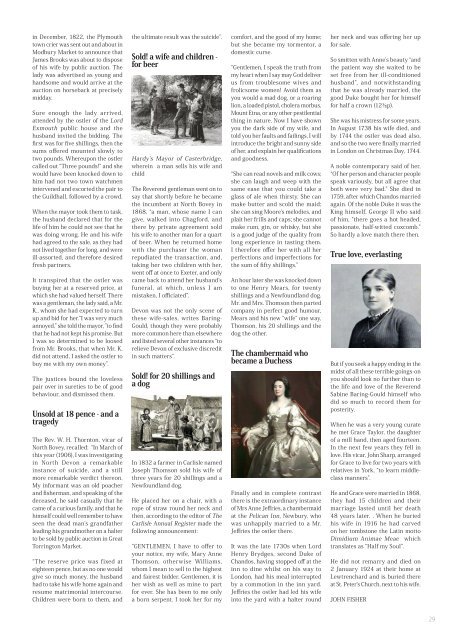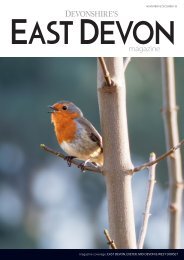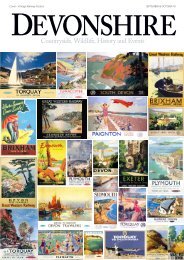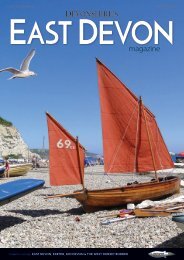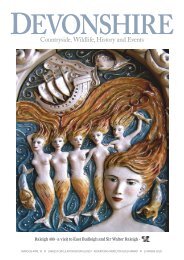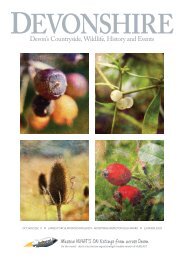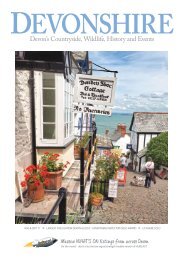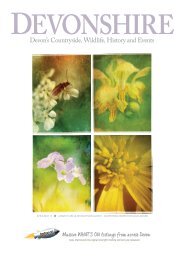Devonshire January February 19
Create successful ePaper yourself
Turn your PDF publications into a flip-book with our unique Google optimized e-Paper software.
in December, 1822, the Plymouth<br />
town crier was sent out and about in<br />
Modbury Market to announce that<br />
James Brooks was about to dispose<br />
of his wife by public auction. The<br />
lady was advertised as young and<br />
handsome and would arrive at the<br />
auction on horseback at precisely<br />
midday.<br />
Sure enough the lady arrived,<br />
attended by the ostler of the Lord<br />
Exmouth public house and the<br />
husband invited the bidding. The<br />
first was for five shillings, then the<br />
sums offered mounted slowly to<br />
two pounds. Whereupon the ostler<br />
called out “Three pounds!” and she<br />
would have been knocked down to<br />
him had not two town watchmen<br />
intervened and escorted the pair to<br />
the Guildhall, followed by a crowd.<br />
When the mayor took them to task,<br />
the husband declared that for the<br />
life of him he could not see that he<br />
was doing wrong. He and his wife<br />
had agreed to the sale, as they had<br />
not lived together for long, and were<br />
ill-assorted, and therefore desired<br />
fresh partners.<br />
It transpired that the ostler was<br />
buying her at a reserved price, at<br />
which she had valued herself. There<br />
was a gentleman, the lady said, a Mr.<br />
K., whom she had expected to turn<br />
up and bid for her.”I was very much<br />
annoyed,” she told the mayor, ”to find<br />
that he had not kept his promise. But<br />
I was so determined to be loosed<br />
from Mr. Brooks, that when Mr. K.<br />
did not attend, I asked the ostler to<br />
buy me with my own money”.<br />
The justices bound the loveless<br />
pair over in sureties to be of good<br />
behaviour, and dismissed them.<br />
Unsold at 18 pence - and a<br />
tragedy<br />
The Rev. W. H. Thornton, vicar of<br />
North Bovey, recalled: “In March of<br />
this year (<strong>19</strong>06), I was investigating<br />
in North Devon a remarkable<br />
instance of suicide, and a still<br />
more remarkable verdict thereon.<br />
My informant was an old poacher<br />
and fisherman, and speaking of the<br />
deceased, he said casually that he<br />
came of a curious family, and that he<br />
himself could well remember to have<br />
seen the dead man’s grandfather<br />
leading his grandmother on a halter<br />
to be sold by public auction in Great<br />
Torrington Market.<br />
“The reserve price was fixed at<br />
eighteen pence, but as no one would<br />
give so much money, the husband<br />
had to take his wife home again and<br />
resume matrimonial intercourse.<br />
Children were born to them, and<br />
the ultimate result was the suicide”.<br />
Sold! a wife and children -<br />
for beer<br />
Hardy’s Mayor of Casterbridge,<br />
wherein a man sells his wife and<br />
child<br />
The Reverend gentleman went on to<br />
say that shortly before he became<br />
the incumbent at North Bovey in<br />
1868, “a man, whose name I can<br />
give, walked into Chagford, and<br />
there by private agreement sold<br />
his wife to another man for a quart<br />
of beer. When he returned home<br />
with the purchaser the woman<br />
repudiated the transaction, and,<br />
taking her two children with her,<br />
went off at once to Exeter, and only<br />
came back to attend her husband’s<br />
funeral, at which, unless I am<br />
mistaken, I officiated”.<br />
Devon was not the only scene of<br />
these wife-sales, writes Baring-<br />
Gould, though they were probably<br />
more common here than elsewhere<br />
and listed several other instances “to<br />
relieve Devon of exclusive discredit<br />
in such matters”.<br />
Sold! for 20 shillings and<br />
a dog<br />
In 1832 a farmer in Carlisle named<br />
Joseph Thomson sold his wife of<br />
three years for 20 shillings and a<br />
Newfoundland dog.<br />
He placed her on a chair, with a<br />
rope of straw round her neck and<br />
then, according to the editor of The<br />
Carlisle Annual Register made the<br />
following announcement:<br />
”GENTLEMEN, I have to offer to<br />
your notice, my wife, Mary Anne<br />
Thomson, otherwise Williams,<br />
whom I mean to sell to the highest<br />
and fairest bidder. Gentlemen, it is<br />
her wish as well as mine to part<br />
for ever. She has been to me only<br />
a born serpent. I took her for my<br />
comfort, and the good of my home;<br />
but she became my tormentor, a<br />
domestic curse.<br />
“Gentlemen, I speak the truth from<br />
my heart when I say may God deliver<br />
us from troublesome wives and<br />
frolicsome women! Avoid them as<br />
you would a mad dog, or a roaring<br />
lion, a loaded pistol, cholera morbus,<br />
Mount Etna, or any other pestilential<br />
thing in nature. Now I have shown<br />
you the dark side of my wife, and<br />
told you her faults and failings, I will<br />
introduce the bright and sunny side<br />
of her, and explain her qualifications<br />
and goodness.<br />
“She can read novels and milk cows;<br />
she can laugh and weep with the<br />
same ease that you could take a<br />
glass of ale when thirsty. She can<br />
make butter and scold the maid;<br />
she can sing Moore’s melodies, and<br />
plait her frills and caps; she cannot<br />
make rum, gin, or whisky, but she<br />
is a good judge of the quality from<br />
long experience in tasting them.<br />
I therefore offer her with all her<br />
perfections and imperfections for<br />
the sum of fifty shillings.”<br />
An hour later she was knocked down<br />
to one Henry Mears, for twenty<br />
shillings and a Newfoundland dog.<br />
Mr. and Mrs. Thomson then parted<br />
company in perfect good humour,<br />
Mears and his new “wife” one way,<br />
Thomson, his 20 shillings and the<br />
dog the other.<br />
The chambermaid who<br />
became a Duchess<br />
Finally and in complete contrast<br />
there is the extraordinary instance<br />
of Mrs Anne Jeffries, a chambermaid<br />
at the Pelican Inn, Newbury, who<br />
was unhappily married to a Mr.<br />
Jeffries the ostler there.<br />
It was the late 1730s when Lord<br />
Henry Brydges, second Duke of<br />
Chandos, having stopped off at the<br />
inn to dine whilst on his way to<br />
London, had his meal interrupted<br />
by a commotion in the inn yard.<br />
Jeffries the ostler had led his wife<br />
into the yard with a halter round<br />
her neck and was offering her up<br />
for sale.<br />
So smitten with Anne’s beauty “and<br />
the patient way she waited to be<br />
set free from her ill-conditioned<br />
husband”, and notwithstanding<br />
that he was already married, the<br />
good Duke bought her for himself<br />
for half a crown (12½p).<br />
She was his mistress for some years.<br />
In August 1738 his wife died, and<br />
by 1744 the ostler was dead also,<br />
and so the two were finally married<br />
in London on Christmas Day, 1744.<br />
A noble contemporary said of her,<br />
“Of her person and character people<br />
speak variously, but all agree that<br />
both were very bad.” She died in<br />
1759, after which Chandos married<br />
again. Of the noble Duke it was the<br />
King himself, George II who said<br />
of him, “there goes a hot headed,<br />
passionate, half-witted coxcomb.”<br />
So hardly a love match there then.<br />
True love, everlasting<br />
But if you seek a happy ending in the<br />
midst of all these terrible goings-on<br />
you should look no further than to<br />
the life and love of the Reverend<br />
Sabine Baring-Gould himself who<br />
did so much to record them for<br />
posterity.<br />
When he was a very young curate<br />
he met Grace Taylor, the daughter<br />
of a mill hand, then aged fourteen.<br />
In the next few years they fell in<br />
love. His vicar, John Sharp, arranged<br />
for Grace to live for two years with<br />
relatives in York, “to learn middleclass<br />
manners”.<br />
He and Grace were married in 1868,<br />
they had 15 children and their<br />
marriage lasted until her death<br />
48 years later. . When he buried<br />
his wife in <strong>19</strong>16 he had carved<br />
on her tombstone the Latin motto<br />
Dimidium Animae Meae which<br />
translates as “Half my Soul”.<br />
He did not remarry and died on<br />
2 <strong>January</strong> <strong>19</strong>24 at their home at<br />
Lewtrenchard and is buried there<br />
at St. Peter’s Church, next to his wife.<br />
JOHN FISHER<br />
29


